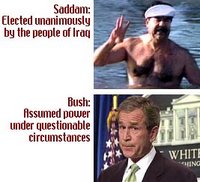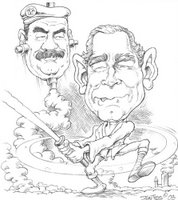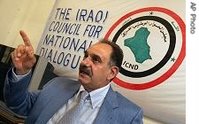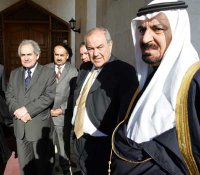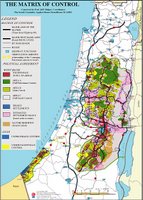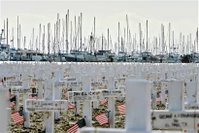 Bush is getting recipes from all sides for his 'all new' Iraquagmire Stew.
Bush is getting recipes from all sides for his 'all new' Iraquagmire Stew. He says he's "making good progress toward coming up with a plan that we think will help us achieve our objective".
 I know I'm not spilling the beans to my knowledgeable readers who know that how so many people the Decider 'listens' to, his decision will not be fixed in his mind until he hears from the last person who speaks to him. And we all know that's always the very patient Dick Cheney. This process of cooking up America's next bowl of Mess-o-Potamian stew won't be over until Darth Vader whispers.
I know I'm not spilling the beans to my knowledgeable readers who know that how so many people the Decider 'listens' to, his decision will not be fixed in his mind until he hears from the last person who speaks to him. And we all know that's always the very patient Dick Cheney. This process of cooking up America's next bowl of Mess-o-Potamian stew won't be over until Darth Vader whispers.Until that moment arrives, the media's headlines will string us along in suspense? NOT!
Personally, I would bank on the veracity of General William E. Odom's Six Brutal Truths about Iraq which Indicted Plagiarist was good enough to post in a comment on my 17-December column.
William R. Polk, co-author of the brand-new monograph, Out of Iraq, makes this Informed Comment about the inadequacies of the Baker-Hamilton recommendations, in part:
. . . The Americans must learn that when a bully falls down people gather around to kick him while he is down, not to offer help.
. . . . what Arab nations would be likely to contribute troops to the proposed international stabilization force? And how could it be assured that these troops would remain under UN control and not act on behalf of their donor nations?
. . . . positive element in Baker-Hamilton is the admission that we need to get out of Iraq. The negative aspect of Baker-Hamilton is that it does not realistically face what that means. What it does, understandably given its origin and composition, is to attempt reach a compromise. Such compromises, of which diplomatic history affords many examples, are attractive because they preserve reputations, cover over mistakes and seem statesmanlike.
 All of the king's horse thieves and all the king's pundits cannot put Bush and Cheney's pottery barn back together. They have simply broken too many pots.
All of the king's horse thieves and all the king's pundits cannot put Bush and Cheney's pottery barn back together. They have simply broken too many pots.As I suggested in these pages on December 17, hanging out in Iraq there is no shortage of thugs with well-armed gangs who know how to fight. They may not be disciplined units at the moment, but they will gain discipline and credibility faster than any of the so-called Iraqi police and armies drawing our pay and serving at our beck and call.
That's the bare-naked basics of 'regime change' anyway: exchanging one regime with another, replacing one thug with another.
There are rumors that Saddam will be summarily executed, perhaps this weekend. Personally, I oppose the death penalty, but only on abstracted pragmatic grounds. In this case, however, removing Iraq's Tony Soprano with dispatch may be helpful in expediting history. The thug is dead - long live the thug. Remember the Bolsheviks' seemingly pointless execution of the Romanovs? As long as the trappings of the deposed regime's thugs are allowed to hang around, future thugs are less disposed to make their moves.
That's what we need to have happen in Iraq, ASAP!
We need to get out of their way, so Iraqi thugs can select a future thug-in-chief and we we can stop being their godfather.



